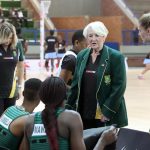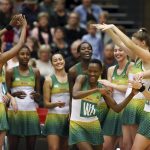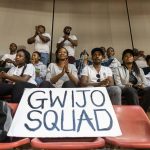Proteas break through at Netball World Cup
The Spar Proteas set themselves a target of finishing in the top four at the World Cup. Now that they have achieved this goal, they want more in what could be a historic run.
Author:
20 July 2019

South Africa’s national netball team have shattered the fifth-place ceiling that has stifled them for years and entered a realm in which the players believe they belong. The Spar Proteas will play in the semifinal of the Netball World Cup, on Saturday 20 July against Australia, for the first time since 1995.
They came into this tournament ranked fifth in the world. That seemed a fair reflection considering that in the previous five World Cups, the Proteas finished fifth on four occasions – in 1999, 2003, 2011 and 2015 – with a sixth-place finish in 2007 breaking the chain.
Behind perennial finalists Australia and New Zealand, who have lifted the title 11 and four times respectively; England, the most recent Commonwealth Games champions; and Jamaica, who have competed in every World Cup since 1967, the South Africans found themselves in daunting company.
Related article:
Like with so many South African national teams, this psychological barrier had proved debilitating. But under the guidance of head coach Norma Plummer – a three-time World Cup winner with Australia, first as a player in 1975 and then as a coach in 2007 and 2011 – the Proteas added structure and discipline to their natural flair and athleticism.
With captain Bongiwe Msomi fostering a culture that encourages freedom of expression on and off the court, the Proteas unburdened themselves from history. This was a new dawn for the nation’s netball players.
“We came here to finish in the top four, that was always the goal,” said Shadine van der Merwe, who is making her World Cup debut in Liverpool. “We put a lot of pressure on ourselves and came in with expectations. But that doesn’t mean we were frightened by that. We know how good we can be and we’ve been playing some tight netball. We had a lot of confidence going in and just needed to take it game by game.”
The road to the semifinals
South Africa’s campaign kicked off against Trinidad and Tobago, a side they usually beat but one more than capable of causing an upset. The Proteas brushed aside the women in red and black, triumphing 76-45 with goal shooter Lenize Potgieter slotting 42 of her 43 attempts at the net.
Relative minnows Fiji were emphatically dispatched the next day by a margin of 90-35. Potgieter again was near perfect, missing only one of her 34 shots, while Erin Burger was sent higher up the court and impressed with 32 points of her own.
Next came the side’s litmus test, a daunting duel with Jamaica. Four years ago in Singapore, the Sunshine Girls, as the Jamaicans are known, hammered South Africa 72-45. In fact, the Caribbean outfit held a 4-1 advantage over their African counterparts in World Cups and had enjoyed a run of eight consecutive wins in this lopsided contest.
But this was a different Proteas side, one hardened by experience, sharpened on the court and resolute in their vision. In January, they beat England and took New Zealand to extra time, narrowly losing by 62 points to 64.
“Something has changed in South African netball and we no longer see ourselves as a team that is just happy to be a part of big tournaments,” said Maryka Holtzhausen, 32, a veteran of three World Cups and a wily goal attack with sharp distribution and efficiency in front of the net. “We came here with a clear path. We took a look at that ceiling of fifth place and we wanted to burst through. But we needed to beat Jamaica in order to do that. And to do that, we needed to be at our best.”
Related article:
The Proteas used a shock-and-awe approach and exploded out of the blocks, seemingly taking their more fancied opponents by surprise to claim a remarkable 55-52 victory.
“It’s an amazing feeling, you have no idea!” beamed Potgieter after the match. “To beat the No. 2 side in the world, to be in a team that never gives up… we just kept on fighting. We are able to beat anyone in the world.”
Amid her euphoria, Potgieter also remarked on an aspect of the game she’d noticed that could have wider repercussions on netball in South Africa: “That’s the [type of] game people want to watch. The crowd were on their feet when the scores were level. The atmosphere was amazing.”
Overseas experience
Potgieter plies her trade in Australia, where she represents the Queensland Firebirds in the professional Super Netball league. Down under, matches are contested by internationally recognised players in front of packed houses around the country. The same applies in the Netball Superleague in the United Kingdom.
“There is an enthusiasm for netball in the UK that is so different to what it’s like back home,” said Holtzhausen, who captains the Severn Stars, the club representing the South West and West Midlands. “That is of course driven by the success of the national team. That is why it is so important we do well as South Africans at this World Cup. If we can achieve something special, we can show people back home that netball is not just a hobby or a game only for schoolgirls. We can give the country something to be proud of and that can lead to sponsorship and an increase in professionalism.”
Unfortunately, it is not that simple. One of the variables that encourages the growth of any sport is a competitive and enticing domestic league that has a wide appeal across the nation. In the UK, Superleague clubs travel from Cardiff and London in the south to Manchester and Glasgow in the north. Fans get to experience the thrill of welcoming new teams to their home arenas and some diehards even travel to away games.
Related article:
“That creates a culture that is similar to the football or rugby clubs,” said Van der Merwe, who just completed her first season with the Surrey Storm. “It adds a more professional feel to things. In South Africa, the competition is played at the same venue.”
This year, the Telkom Netball League took place at the University of Pretoria’s Rembrandt Hall. The main concern for players and fans was its size, which, according to Holtzhausen, is a contributing factor to the game’s struggles.
“It’s so big,” Holtzhausen said. “So even if we do get big crowds, the fans feel so far away and so spread out. Here in England, the venues are small. If we get over a thousand people we’ve done well. But because the venues feel purpose-built, the crowds create such an atmosphere and they’re right on top of you. That elevates your performance so you raise your game and put on a show. That then gets the crowd going even more. Fans who leave games like that remember them for a long time and want to come back. That generates a culture that we don’t have in South Africa.”
Dynamic performance
After topping their preliminary group, the Proteas moved to the second stage of the World Cup. Here, they batted aside Scotland 66-38, with Msomi leading from the front with a dynamic performance filled with intelligent interplay.
Then came an all-African derby against Uganda, but the She-Cranes were shot down 67-40. Potgieter’s 46 points moved her into the top three point scorers of the competition.
This meant South Africa qualified for the final four with a game to spare. Their clash with England would serve merely as a dress rehearsal for the tough semifinal to come. Unfortunately for the women in green and gold, England handed them their first loss.
The 47-58 defeat means they take on Plummer’s old side in the semifinal. The Diamonds are a formidable unit and are blessed with superstar names throughout the court. They topped their second stage group by holding on to a narrow lead against New Zealand in one of the best games of the tournament, escaping with a 50-49 win.
Few will give the Proteas a chance. Form and history dictates that there will only be one winner in what, on the surface at least, looks likely to be a one-sided affair. But if the side needed any more incentive, Telkom has pledged a R1 million bonus to each of the 12 players should they lift the trophy on Sunday 21 July. A silver medal would see them pocket R500 000 each.
Spar, the team’s title sponsor, confirmed before the squad’s departure that massive windfalls would be guaranteed for any medal placing, with the team sharing R1 million for a win, R750 000 for second and R500 000 for third.
Related article:
Adding to the potential growth of the game is the impending INF Netball World Cup 2023 in Cape Town, the first time the tournament will be held on African soil. The significance of this moment is not lost on Holtzhausen.
“This World Cup was always a chance to let the people back home know that our sport is one worth investing in,” she exclaimed. “We are ambassadors of our country. We are proudly South African. We know what this will mean to the people who have worked so hard to develop the sport. We’re hoping this can prove to be the start of something special.”




